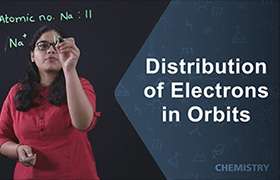CBSE Class 9 Answered
sir/mam please explain about orbit,sub orbit,shell,sub shell and orbital.
Asked by | 12 Jan, 2012, 04:10: PM
First, there are the main shells of the atom, and these are numbered 1, 2, 3, 4, etc. (or like some doing it alphabetically K, L, M, N, ...).
In the periodic table you will encounter them as seven periods.
Each shell holds orbitals (sometimes called sub-shells, but they are not), and different shells have different numbers of orbitals associated with it. The higher the number of the main shell, the more orbitals it contains. In fact, the number of the main shell is equal to the number of orbitals it contains. The types of orbitals are labeled like this: s, p, d, f, and not so very important: g, h, i, etc (alphabetically after i).
So far we have:
Main shell #1
-- contains one orbital (s-orbital)
Main shell #2
-- contains two orbitals (s-orbital, and p-orbital)
Main shell #3
-- contains three orbitals (s-orbital, p-orbital, and d-orbital)
Main shell #4
-- contains four orbitals (s-orbital, p-orbital, d-orbital, and f-orbital)
etc...
Now we can further break down orbitals! The p-orbital is actually composed of three sub-orbitals and the d-orbital is composed of 5 sub-orbitals and f-orbital in 7 sub-orbitals.
So we have:
s-orbital: just a single orbital, called just the s-orbital
p-orbitals: composed of 3 sub-orbitals, called the px-, py-, and pz-orbitals
d-orbitals: composed of 5 sub-orbitals, called the dxy-, dxz-, dyz-, dx2-y2, and dz2-orbtials
f-orbitals: composed of 7 sub-orbitals, called fz3, fxz2, fyz2, fxyz, fy(3x2-y2), fx(x2-3y2), fy(3x2-y2).
etc...
In the periodic table you will encounter them as seven periods.
Each shell holds orbitals (sometimes called sub-shells, but they are not), and different shells have different numbers of orbitals associated with it. The higher the number of the main shell, the more orbitals it contains. In fact, the number of the main shell is equal to the number of orbitals it contains. The types of orbitals are labeled like this: s, p, d, f, and not so very important: g, h, i, etc (alphabetically after i).
So far we have:
Main shell #1
-- contains one orbital (s-orbital)
Main shell #2
-- contains two orbitals (s-orbital, and p-orbital)
Main shell #3
-- contains three orbitals (s-orbital, p-orbital, and d-orbital)
Main shell #4
-- contains four orbitals (s-orbital, p-orbital, d-orbital, and f-orbital)
etc...
Now we can further break down orbitals! The p-orbital is actually composed of three sub-orbitals and the d-orbital is composed of 5 sub-orbitals and f-orbital in 7 sub-orbitals.
So we have:
s-orbital: just a single orbital, called just the s-orbital
p-orbitals: composed of 3 sub-orbitals, called the px-, py-, and pz-orbitals
d-orbitals: composed of 5 sub-orbitals, called the dxy-, dxz-, dyz-, dx2-y2, and dz2-orbtials
f-orbitals: composed of 7 sub-orbitals, called fz3, fxz2, fyz2, fxyz, fy(3x2-y2), fx(x2-3y2), fy(3x2-y2).
etc...
When a planet moves around the sun, you can plot a definite path for it which is called an orbit.
To plot a path for something you need to know exactly where the object is and be able to work out exactly where it's going to be an instant later. You can't do this for electrons.
Answered by | 12 Jan, 2012, 05:51: PM
Application Videos
Concept Videos
CBSE 9 - Chemistry
Asked by shivalaxmi0205 | 08 Mar, 2023, 07:47: PM
CBSE 9 - Chemistry
Asked by rekhachaturvedu422 | 01 Aug, 2022, 04:16: PM
CBSE 9 - Chemistry
Asked by pandeyabhishek1576 | 16 Feb, 2022, 01:24: PM
CBSE 9 - Chemistry
Asked by senniasamy | 10 Jan, 2022, 08:48: PM
CBSE 9 - Chemistry
Asked by nathdarshana | 20 Nov, 2020, 07:03: PM
CBSE 9 - Chemistry
Asked by archanakad | 25 Aug, 2020, 08:59: PM
CBSE 9 - Chemistry
Asked by namyairmalwar9803.5sdatl | 07 Jun, 2020, 01:47: PM
CBSE 9 - Chemistry
Asked by fathima1012006 | 31 May, 2020, 10:44: AM
CBSE 9 - Chemistry
Asked by gspublicschool | 27 Apr, 2020, 11:23: AM
CBSE 9 - Chemistry
Asked by Jaiwanthsiva | 15 Apr, 2020, 01:51: PM











